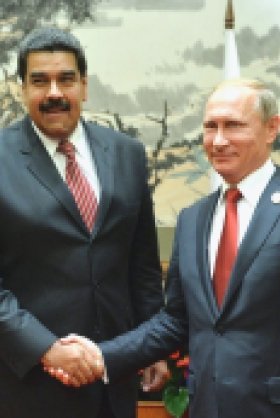Russia’s Continuing Engagement with Venezuela in 2019 and Beyond - An Update





In a new publication on the relationship between Russia and Venezuela, Russian scholar Vladimir Rouvinski argues that U.S. sanctions against Rosneft Trading, SA, imposed in February 2020, “jeopardize Moscow’s existing approach to Venezuela, which relies heavily on the energy sector.” Previously, and for the first time since the collapse of the Soviet Union, “Russia managed to veto Washington’s attempt at regime change in a country of the Western Hemisphere friendly to Russia.”
According to Rouvinski, Russian political and security elites view the Venezuelan situation through the lens of a “global process in which Russia struggles to ensure its just place in the international arena,” thwarting attempts by Western powers to reduce its political and economic autonomy. Rosneft—and Venezuela—are also key to Vladimir Putin’s effort to “sustain and expand” Russia’s role as a global energy supplier.
At the same time, Russian involvement in Venezuela has “laid bare the many limitations of Russian policy,” not only a shortage of financial resources but also the weak governance capacity of the chavista government. While Russia has sent military personnel to Venezuela, assisted with oil sales to skirt U.S. sanctions, and defended the Maduro regime in the United Nations, Rouvinski argues that the Kremlin’s goals are to “maintain a modicum of control and assure that Rosneft’s assets are safe.” Moscow views the inclusion of Venezuela in high-level meetings between U.S. and Russian officials as a sign that Russia is a “key player in the struggle over Venezuela’s future.”


The Wilson Center’s prestigious Latin America Program provides non-partisan expertise to a broad community of decision makers in the United States and Latin America on critical policy issues facing the Hemisphere. The Program provides insightful and actionable research for policymakers, private sector leaders, journalists, and public intellectuals in the United States and Latin America. To bridge the gap between scholarship and policy action, it fosters new inquiry, sponsors high-level public and private meetings among multiple stakeholders, and explores policy options to improve outcomes for citizens throughout the Americas. Drawing on the Wilson Center’s strength as the nation’s key non-partisan policy forum, the Program serves as a trusted source of analysis and a vital point of contact between the worlds of scholarship and action. Read more


The Kennan Institute is the premier US center for advanced research on Eurasia and the oldest and largest regional program at the Woodrow Wilson International Center for Scholars. The Kennan Institute is committed to improving American understanding of Russia, Ukraine, Central Asia, the South Caucasus, and the surrounding region through research and exchange. Read more



